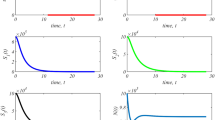Abstract
In cancer chemotherapy a tumor development is delivered by toxic drugs and the influence of drugs’ on human body is also checked. The minimization of the tumor burden at a fixed period of time and the minimization of the toxicity of drug regimes will be sought corresponding to the mathematical Goempertz growth model. The effective treatment schedules are search with the help of Modified Differential Evolution Multi-Objective Algorithm. The numerical tests of proposed algoritm show the outcomes for each drug regimes. The tumor is eradicated through the treatment period and the toxic effects are small enough according to the strong set of constraints. The simulation of human body answering for different treatment scenarios can help to an oncologist, which can explore treatment schedules before deciding upon admissible doses regimes for suitable clinical treatment.
Access this chapter
Tax calculation will be finalised at checkout
Purchases are for personal use only
Preview
Unable to display preview. Download preview PDF.
Similar content being viewed by others
References
Barbour, R., Corne, D., McCall, J.: Accelarated optimisation of chemotherapy dose schedules using fitness inheritance. In: IEEE Congress on Evolutionary Computation (2010)
Brownlee, A., Pelikan, M., McCall, J., Pertrovski, A.: An application of a multivariate estimation of distribution algorithm to cancer chemotherapy, Medal (2008)
Chingola, R., Foroni, R.I.: Estimating the growth kinetics of experimental tumors from as few as two determinations of tumor size: Implications for clinical oncology. IEEE Trans. on Biomedical Engineering 5, 808–815 (2005)
Das, S., Ajith, A., Amit, K.: Particle swarm optimization and differential evolution algorithms: Technical analysis, applications and hybridization perspectives. SCI, vol. 116, pp. 1–38. Springer, Heidelberg (2008)
Dearnaley, D., et al.: Handbook of adults cancer chemotherapy schedules. The Medicine Group (Education) Ltd., Oxfordshire (1995)
Gong, W., Cai, Z.: A multiobjective differential evolution algorithm for contrained optimization. In: IEEE Congress on Evolutionary Computation, pp. 181-188 (2008)
Iliadis, A., Barbolosi, D.: Optimizing drug regimens in cancer chemotherapy by an efficacy-toxicity mathematical model. Computers and Biomedical Research 33, 211–226 (2000)
Martin, R., Teo, K.: Optimal control of drug administration in cancer chemotherapy. World Scientific, Singapore (1994)
Petrovski, A., McCall, J.: Multi-objective Optimisation of Cancer Chemotherapy Using Evolutionary Algorithms. In: Zitzler, E., Deb, K., Thiele, L., Coello Coello, C.A., Corne, D.W. (eds.) EMO 2001. LNCS, vol. 1993, pp. 531–545. Springer, Heidelberg (2001)
Petrovski, A., Shakya, S., McCall, J.: Optimising cancer chemotherapy using an estimation of distribution algorithm and genetic algorithms, Medal Report No. 2008005 (January 2008)
Porombka, P.: A Meta-heuristic approach for the medical treatment planning, M.Sc. Thesis (unpublished), Wroclaw University of Technology, Wroclaw (2010)
Robič, T., Filipič, B.: DEMO: Differential evolution for multiobjective optimization. In: Coello Coello, C.A., Hernández Aguirre, A., Zitzler, E. (eds.) EMO 2005. LNCS, vol. 3410, pp. 520–533. Springer, Heidelberg (2005)
Santana-Quintero, L.V., Hernadez-Diaz, A.G., Molina, J., Coello Coello, C.A., Caballero, R.: DEMORS: A hybrid multi-objective optimization algorithm using differential evolution and rough set theory for constrained problems. Computers and Operations Research 37, 470–480 (2009)
Wheldon, T.: Mathematical models in cancer research. Adam Hilger, Bristol, Philadelphia (1988)
Author information
Authors and Affiliations
Editor information
Rights and permissions
Copyright information
© 2012 Springer-Verlag Berlin Heidelberg
About this paper
Cite this paper
Szlachcic, E., Porombka, P., Kotowski, J. (2012). Multi-objective Optimization of Cancer Chemotherapy Treatment. In: Moreno-Díaz, R., Pichler, F., Quesada-Arencibia, A. (eds) Computer Aided Systems Theory – EUROCAST 2011. EUROCAST 2011. Lecture Notes in Computer Science, vol 6928. Springer, Berlin, Heidelberg. https://doi.org/10.1007/978-3-642-27579-1_33
Download citation
DOI: https://doi.org/10.1007/978-3-642-27579-1_33
Publisher Name: Springer, Berlin, Heidelberg
Print ISBN: 978-3-642-27578-4
Online ISBN: 978-3-642-27579-1
eBook Packages: Computer ScienceComputer Science (R0)




